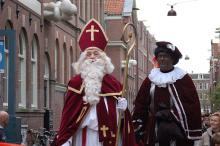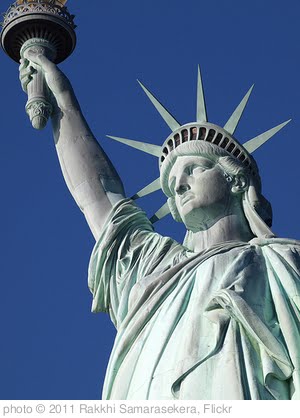Racism

Happy Sinterklaas?
Today marks a traditional winter holiday in Holland and other parts of the European Low Countries (the Netherlands, Belgium, Lille and Arras, predominantly) featuring Sinter Klaas, the forerunner of our Santa Claus, who is traditionally accompanied by a helper named Zwarte Piet (aka "Black Pete") — a young man in black face with curly black hair, thick red lips and dressed as a courtisan with a velvet jacket and frilled shirt.
Sinterklaas — who also goes by Sint Niklaas or De Sint in Holland and environs — was a stranger to me until a few years ago when Dutch-American friends introduced him to me. In my friends' home this morning, the children will awaken to wooden shoes filled with goodies.
Sounds like a charming holiday tradition from the old country. But is it simply that?
I made myself read the Grand Jury report about Sandusky's alleged crimes and it was 23 pages of vile and inhuman behavior not only by the predator but by those who actually saw it, heard of it, or received reports about it across their desk.
Then to also learn that all these children were black deepens my sadness.
I am forced to ask some really hard questions.
Are black people that expendable?
Was the fact that they were black, poor and powerless the reason it was overlooked?
Is football, a school, and personal reputation so important that a 10-year-old black boy being raped in a bathroom can be covered up?
I had an idea that power was corrupt, but this is much more than simply corrupt. It is pure evil.
If justice is only an implication, it can easily become optional and, especially in privileged churches, non-existent. In the New Testament, conversion happens in two movements: Repentance and following. Belief and obedience. Salvation and justice. Faith and discipleship.
Atonement-only theology and its churches are in most serious jeopardy of missing the vision of justice at the heart of the kingdom of God. The atonement-only gospel is simply too small, too narrow, too bifurcated, and ultimately too private.
The forthcoming dedication of the national memorial monument honoring Rev. Dr. Martin Luther King, Jr., affords an opening for considering the complexity and meaning of his leadership. He was not the tamed and desiccated civil hero as often portrayed in the United States around the time of his birthday, celebrated as a national holiday. He was until the moment of his death raising issues that challenged the conventional wisdom on poverty and racism, but also concerning war and peace.
King was in St. Joseph's Infirmary, Atlanta, for exhaustion and a viral infection when it was reported that he would receive the 1964 Nobel Peace Prize. As Gary M. Pomerantz writes in Where Peachtree Meets Sweet Auburn, this was the apparent cost exacted by intelligence surveillance efforts and the pressures of learning that Attorney General Robert F. Kennedy had formally approved wiretaps by the Federal Bureau of Investigation. His evolving strength as a leader is revealed in his remarks in Norway that December, which linked the nonviolent struggle of the U.S. civil rights movement to the entire planet's need for disarmament.
John Stott died this Wednesday. He was 90 years old. What many people don't understand is that he was the most influential 20th-century evangelical leader in the world, with the exception of Billy Graham. Stott became the Anglican rector of All Souls Church in downtown London at the age of 29 in 1950, and he stayed there for his entire ministry. But from his parish at Langham Place in the city's West End, and right across from BBC headquarters, John Stott spoke to the world with 50 books that sold 8 million copies. He also traveled the globe , speaking, teaching, convening, mentoring, and bird watching -- a personal passion.
Perhaps the most telling thing about this man is all the personal stories about "Uncle John" that the world is now hearing, from many Christian leaders around the world who were profoundly influenced, encouraged, and supported by John Stott. And secondly, how such a giant in the Christian world remained so humble, as testified to by those who knew him who say how "Christ-like" he was.
"I will call them my people, who were not my people. And her beloved, who was not beloved." (Romans 9:25 referencing Hosea 2:23)
Estranged, alienated, and removed; anyone living in an industrialized modern society in the 21st century would be able to define, or at least identify the sentiments of these words. Our time is one of mass communication and instantaneous access to knowledge. And yet our lives are too compartmentalized, increasingly divided, and our society reflects this. Indeed the existential writers of yesteryear were correct in diagnosing the iron cage that would befall us, ultimately leading to an eclipse of reason.
This past weekend, Christians around the world celebrated one of our holiest holi-days: Pentecost. Pentecost, which means "50 days," is celebrated seven weeks after Easter (hence the 50), and marks the birthday of the Church, when the Holy Spirit is said to have fallen on the early Christian community like fire from the heavens. (For this reason, lots of Christians wear red and decorate in pyro-colors. This day is also where the fiery Pentecostal movement draws its name).
But what does Pentecost Sunday have to do with just another manic Monday?
What does a religious event a couple of thousand years old have to offer the contemporary, pluralistic, post-Christian world we live in? I'd say a whole lot. Here's why:
Let me start by confessing my bias. Not only am I a Christian, but I am a Christian who likes fire. I went to circus school and became a fire-swallowing, fire-breathing, torch-juggling-pyro-maniac as you'll see here. So naturally, I like Pentecost.
Latina/o Social Ethics: Moving Beyond Eurocentric Moral Thinking, by Miguel A. De La Torre.
